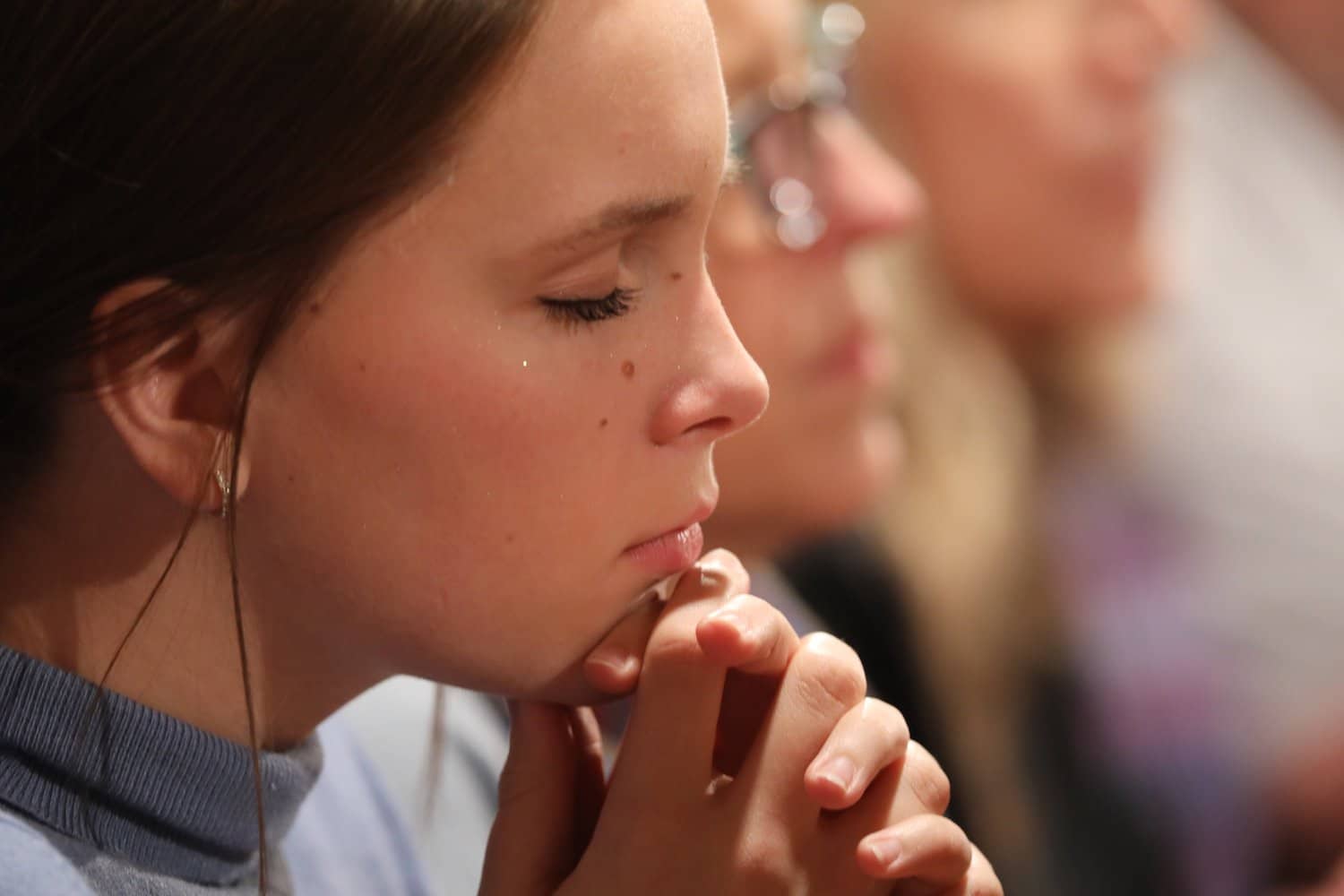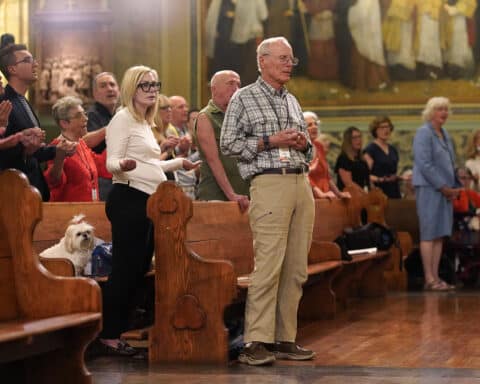Throughout Pride Month in June, our culture has been inundated with symbols and ad campaigns pushing an agenda that suggests people of all ages should identify with their sexual desires or their own understanding of gender. However, one Catholic apostolate that ministers to those with an LGBTQ+ experience is helping people encounter Christ and the truth about sexuality and gender.
“I think the best way for an individual Catholic to respond to Pride Month is to go out of your way to show care and compassion to the LGBTQ+ people in your life,” Anna Carter, co-founder and president of Eden Invitation, told Our Sunday Visitor. “Whether they’re inside the Church or out of it, be someone that shows that life with Christ is a transformative experience of hope and joy!”
“It can be easy to feel overwhelmed with ‘responding’ to something that is, in reality, a massive, multinational, sociocultural phenomenon (with a healthy dose of corporate opportunism),” Carter said. But Carter’s work shows that even one or two people can make a difference.
Eden’s origins
In 2017, Carter and co-founder Shannon Ochoa began Eden Invitation, a faith-based community organization rooted in the Catholic faith. Their group promotes “original personhood beyond the LGBT+ paradigm” and emphasizes the intrinsic dignity of every person as a unique, unrepeatable human being made in the image and likeness of God.
Based in St. Paul, Minnesota, Eden Invitation offers a wealth of resources online, from recommended reading and storytelling initiatives to a blog. Its website, sprinkled with quotes from the Catechism of the Catholic Church and Pope St. John Paul II’s Theology of the Body, welcomes visitors with the open, conversational tone of a friend. It also serves as an invitation to community, through book clubs and retreats.
On the website, Carter, 35, and Ochoa, 30, reveal their personal stories as Catholics who experienced attraction to other girls while growing up.
“Growing up in the Church in the early 2000s, so much of the dialogue was fixated on a ‘culture war’ mentality around this topic,” Ochoa, who also serves as the group’s vice president, told Our Sunday Visitor. “As a kid and teen, I loved Jesus and wanted to be close to him and the Church, so when I realized amidst that Church culture I was attracted to women I thought, ‘Oh no, am I the enemy?'”
“I tried to hide that part away and was afraid of it, because all I heard and knew at the time was so deeply politicized, when what I needed was someone to receive me, to process with and to show me what discipleship with and opening up this layer of my heart to Jesus can look like,” she said.
Eden Invitation, she said, provided that opportunity.
“In starting Eden Invitation, I wanted to create a space to do just that,” she said. “To let people with an LGBTQ+ experience know that they were good, to offer a space of community, and to hopefully lead people to Jesus.”
A unique invitation
Carter called Eden Invitation the only lay-led national organization caring for people with LGBTQ+ experiences and, more specifically, the only national group faithful to the Church that directly cares for people experiencing gender discordance.
While it draws from Carter and Ochoa’s Catholic faith, the group also partners with and welcomes Christians of other denominations who share a traditional sexual ethic.
The group’s website lists its values and a doctrinal statement that professes adherence to Church teaching.
“To experience discord within one’s bodily sex, or to experience attraction to someone of the same sex, is not sinful per se,” it reads, in part. “We believe that sexual expression is intended to be unitive and procreative within the context of an exclusive, indissoluble marriage between one man and one woman. Sexual expression outside of this union is sinful for all persons.”
The statement concludes, “Every person is called to holiness and to chaste integration of their sexuality according to their state in life.”
Among other things, Ochoa said that they seek to empower the community through a discipleship model similar to other evangelistic ministries while applying some of the uniqueness of the LGBTQ+ experience.
“We seek to form and empower disciples in their unique charisms and calls on how they can be a gift to the Church and world, even if it may look different than the majority,” she said.
‘Come and see’
Carter said that the group’s name, “Eden Invitation,” sums up their ethos and posture.
“So much of the general ministry approach — to same sex desires in particular — had been limited to an explaining the ‘no’ inherent in the sexual ethics,” she said. “We wanted to pan the camera back, so to speak, and look at a larger question: What does it mean to be a person? How does God want to encounter us in the garden?”
“And we didn’t want to push that onto people,” she added, “but to extend an invitation like Christ does. ‘Come and see!'”
Ochoa said that they selected the name during a “brainstorming day” after they placed words that resonated with them on a wall. When a friend put “Eden” and “Invitation” together, the combination felt right, she said.
“Eden, allowing our origins to be a guidepost and foundation for where God is leading and directing us,” she explained. “Invitation, knowing there was a deep need for a pastoral approach to the topic of LGBTQ+ experiences in the Church born out of her maternal heart, to invite not argue.”

Unconditional love
Eden Invitation shares what Carter and Ochoa experienced in Eucharistic adoration: that every person is good and lovable. In their personal stories, the two co-founders pointed to encountering Christ in Eucharistic adoration as a turning point — a point where they felt loved, just as they were.
“For me, experiencing Eucharistic adoration in high school was a particularly arresting experience,” Carter remembered. “I felt that Jesus saw me, knew me and loved me right where I was.”
Ochoa added, “For me, adoration is the place where I came to feel known and loved, to come to love the Lord and to love myself.”
Supporting LGBTQ+ Catholics
The two shared advice for how the Catholic community can support Catholics with an LGBTQ+ experience, beginning by remembering that they exist.
“So often, LGBTQ+ persons are assumed to be outside the parish walls. Instead, we’re a force in culture or an ‘agenda,'” Carter explained. “But there are people who sincerely want to follow Jesus who have an LGBTQ+ experience. I am one of them! And we need you.”
Ochoa drew from the Gospel of Matthew, Chapter 23, for her response. There, she said, Jesus accuses the Pharisees, saying that “they tie up heavy burdens [hard to carry] and lay them on people’s shoulders, but they will not lift a finger to move them.”
“The Church’s teaching on sexuality is a beautiful tapestry; however, in today’s day and age, even with a rich prayer life and dynamic community, if there isn’t more pastoral support from the Church, the teaching can feel like a ‘heavy burden,'” Ohcoa said. “Knowing this, those without an LGBTQ+ experience should ask themselves, ‘How can I lift a finger and help carry this call with them more? How can I create a space for my loved one to encounter and love Jesus more?'”
She gave some recommendations.
“A few possibilities can be to integrate and celebrate diverse vocations — carry some of the costly obedience of fidelity to the Church with some of your own sacrifice and radical hospitality,” she said.
And, she added, Catholics should allow Catholics with an LGBTQ+ experience to support and serve them instead of just seeing them as subjects of ministry.
“Be present to, listen to, ask questions of, and be in this mess of life with us, your LGBTQ+ siblings,” she said. “Tell us you love us, pray with us, show us who Jesus is, and let us bear witness to him, as well.”
“Know that just because we’re in the Church doesn’t mean it isn’t difficult to hear how some fellow Catholics talk about our stories or the wider LGBTQ+ community — check-in with us,” she said. “Don’t tokenize or make us mascots — we just want to love Jesus and be faithful.”
Concrete ideas
They listed ways that Catholics can support family, friends or even people they just met who have an LGBTQ+ experience.
Carter named three.
“First, love your neighbor as yourself,” Carter said. “Second, don’t let this aspect of their experience balloon out of proportion in your own mind.”
“I’ve encountered people who sort of freeze up and stop socializing normally with their loved one because they’re afraid of saying or doing the wrong thing,” she said. “Grab lunch, watch a movie, play mini-golf, go to the farmer’s market — be human together!”
For her third recommendation, Carter suggested, “Be sensitive to the unique contours of their experience.”
“People with LGBTQ+ experiences can feel both encouraged and ostracized by the secular LGBTQ+ space and the Church,” she said. “Ask some questions about that! This will help you better understand their story and give you insight for navigating ongoing relationship[s].”
Ochoa said that, for each person, the approach might vary depending on the relationship, the trust between the two people, and the person’s relationship to faith and the Church.
“What is universal, however, is that people are longing to be known and loved, and that is something anyone can do without compromise,” she said. “Don’t be afraid of this part of someone’s life, whether they’re actively practicing their faith or not.”
Advice for LGBTQ+ people
Carter also offered advice for LGBTQ+ Catholics or Christians who might feel afraid or alone.
“Develop and cultivate a daily prayer life,” Carter said. “Find people that receive your complex life experiences with warmth, humor and encouragement — Eden Invitation can be a great place for that! Make acts of faith, hope and trust, even when you aren’t feeling it! The seeds you sow will bear fruit in time.”
Ochoa wanted to remind LGBTQ+ Catholics or Christians that “you are loved. You are good. You are not alone.”
“There is no cause for shame amidst your experience, and there is a vibrant life possible in the Church,” she said.
“It can be easy to feel caught in the crossfire, a subject for debate,” she concluded, “but you are a unique, beloved, unrepeatable person worthy of being seen, reverenced as holy ground and sought to be understood.”





